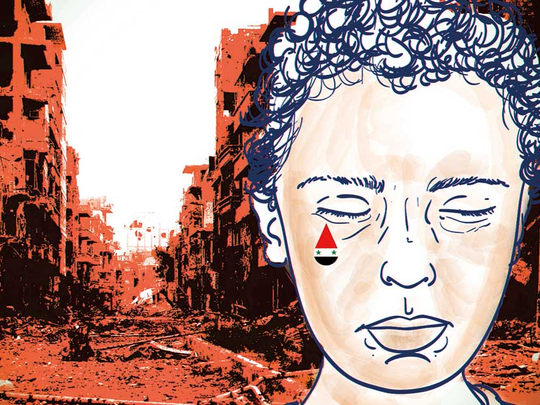
No regime can continue to claim legitimacy when its own sovereignty is continuously challenged on the national level. Its legitimacy becomes deeply more questionable when the regime practically turned, through its own actions, to a party of a vicious war with the people whom it is supposedly in charge to protect and uphold their rights to live in fairness and dignity. With Syria’s war tragically entering its seventh year, President Bashar Al Assad’s regime in Damascus is largely responsible for turning a simple civil protest in March 2011 in the southern city of Dara’a, peacefully demanding reform, into a bloody mayhem unprecedented in the history of mankind since the Second World War.
Hundreds of thousands of people have been killed with catastrophic results. The United Kingdom-based monitoring group, the highly regarded Syrian Observatory for Human Rights, says the casualties now stand at almost half a million. 321,000 people, including 96,000 civilians, have been killed and another 145,000 are missing, including 2,500 children. Other shocking United Nations figures suggest that about 4.5 million people have been driven outside Syria, who currently live as refugees in the neighbouring countries and beyond. There are around 13 million people in need of humanitarian assistance. Additionally, there are almost 6.6 million displaced inside the country. The UN estimates Syria’s total population as of January 2017, is a little under 18 million.
Numerous foreign powers have criminally intervened in Syria, sadly turning it into an almost mini World War. First, Iran with its regionally ambitious Revolutionary Guards dragging with it its arm in Lebanon — the Hezbollah militia. For now, the Al Assad regime feels secure, but only within a greatly shrunk Syria, as his authority is limited to the coastal area stretching from Latakia in the North to the capital, Damascus, in the South.
Civilians regrettably continue to suffer everywhere in the country, including those who live in the regime-controlled territories, for the last six years. Despite numerous rounds of talks in Geneva and the newly opened peace talks at the Astana route in Kazakhstan, it seems the cycle of death and tragedy will continue unabated in a war that keeps changing its nature from bad to worse.
Iran’s colossal intervention was vital to keep Al Assad in power during the war. It was not widely known how deep the Iranian involvement was in the ugly war until 2013 when two high-ranked Iranian officers were killed in Syria. First it was Brigadier General Mohammad Jamali-Paqaleh of the Revolutionary Guards who was assassinated early that year while visiting the shrine of Sayyedah Zainab in the outskirt of Damascus. Then, General Hassan Shateri, also from the Revolutionary Guards, was killed on the road from Beirut to the Syrian capital.
Also, Iran has been vitally instrumental in maintaining the Syrian regime through repeatedly injecting billions of dollars into Al Assad’s coffers. According to opposition monitors, Tehran has given Damascus more than $15 billion (Dh55.17 billion) as of December 2013, but United Nations Special Envoy to Syria, Staffan de Mistura, has claimed that Iran’s contribution to Al Assad’s government budget amounts to at least $6 billion annually. Meanwhile, a research report by Fares Centre for Eastern Mediterranean Studies at Tufts University, confirmed the actual Iranian aid at $15 billion annually.
But the real saviour of Al Assad’s regime is the mighty air cover being provided by Russia. Undoubtedly, Russian President Vladimir Putin’s decision in September 2015 to send his air force to Syria was the decisive factor behind turning the war in favour of the regime in Damascus. From its airbase in Hmaimeem, adjacent to the village of Qirdaha, the birth place of the Al Assad dynasty, and its naval base in the city of Tartous, a strong hold of the Alawite sect, the Russians have been able to keep the regime in place. Both Hmaimeem and Tartous are strategically vital for the Russians. They are the only foreign bases Russia has ever had. Moscow had contracted to use these bases since the Soviet era and has recently renewed the contract for another 35 years and extensively upgraded both the bases over the last year and-a-half — technically as well as militarily.
Now, with six years gone, is it possible to end this conflict peacefully? It is unlikely to happen any time soon. With both the Geneva and Astana routes reaching a roadblock, it is difficult to see how the talks will move forward. Despite the fall of Eastern Aleppo in the hands of the regime last December, it is not correct to say that Al Assad has won the war. But it is equally correct to say that it is unlikely that he will lose without a decisive and powerful intervention against his regime by an outside power. An intervention that, if not topple Al Assad, will at least restore balance by neutralising the advantage that Russia and Iran currently wield. It is not clear yet what line United States President Donald Trump will take to help restore the balance of international influence in this sad country. But latest reports emerging from the battlefield in the eastern city of Raqqa, the so-called capital of Daesh (the self-proclaimed Islamic State of Iraq and the Levant), point to a new and larger deployment of American, European and Arab-led forces on the ground. This kind of intervention seems to be aiming at totally eliminating Daesh and other extremist forces in Syria and balance out the presence of Russia. Such a development is the only way for a more productive talk over the future of Syria in the short term.
Mustapha Karkouti is a former president of the Foreign Press Association, London. You can follow him on Twitter at www.twitter.com/@mustaphatache.










